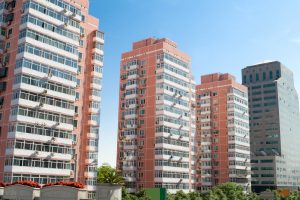In 2017, President Xi Jinping identified “three crucial battles” for China’s development. Chief among them was reducing financial risk. Four years later, the current state of the nation’s real estate market poses the most significant threat to China’s economic stability since the Great Recession of 2008. Real estate prices in China’s major cities are some of the most expensive in the world, and the property market has been a key driver of economic growth since the “reform and opening” period.
Purchasing real estate as an asset has been seen by Chinese consumers as a safe and reliable investment, and up until this point, it has been. Many middle and upper-class Chinese go on to purchase second and even third homes. Along with the expectation of future asset appreciation, owning property denotes higher status in Chinese society and is seen as a benchmark one must reach before getting married and starting a family.
During times of economic growth and prosperity, this model works well as investors see healthy returns and official GDP numbers rise. However, cracks have begun to appear at the base of this societal framework, challenging the stainability of China’s real estate market and the stability of the economic system as a whole. Xi Jinping and the Chinese government have begun to take corrective action, but only time will tell if these measures can stop the bubble from bursting. With nearly 70 percent of Chinese household wealth being tied up in real estate, a collapse in prices would send shockwaves throughout the rest of society.
At one time, China Evergrande Group was the largest real estate company in the world. Today, the company represents the largest threat to the nation’s economic stability. A looming debt crisis has dominated news headlines and has also surely dominated conversations at Zhongnanhai. After Chinese regulators instructed the country’s real estate developers with high debts to refinance, Evergrande found itself overleveraged. The directive came at a tough time for the company, which has nearly $3 billion of dollar-denominated debt maturing this year. As Evergrande begins to sell off pieces of its business, global investors have dumped the company’s bonds due to fear of default. As this vicious cycle continues, the world will watch to see whether the company will be deemed too big to fail and be bailed out by the government, or if market forces will decide the fate of the once-mighty property developer.
The building standards of Chinese apartments are notoriously low, but this isn’t a problem for most investors, because many of them never plan on living in them in the first place. Take a trip on China’s high-speed rail system in between any of the country’s major cities and you will see scores of empty apartment blocks littering the countryside. Beyond the remoteness of these apartments, the fact that shocks most first-time visitors to the country is that the apparently empty apartments all have owners. In response to these sprawling and derelict complexes, Xi has championed the concept of high-quality development, as opposed to the high-speed growth seen in recent decades. Xi knows that inflated GDP numbers mean little if they do not improve the living standards of normal people.
Xi’s new “common prosperity” campaign is attempting to correct the issue of widening social inequality; access to affordable housing is a key component. The Chinese government has floated the idea of implementing a nationwide residential property tax to cool the housing market. This idea has been tried before. In 2011, Chongqing and Shanghai both experimented with new property taxes on second or high-priced homes. However, this plan was not replicated nationwide. While implementing a residential property tax may help cool the market, there is pushback to this plan from inside the Chinese Communist Party itself. Many CCP officials use property to hide their wealth, and therefore, there has not been the political will to implement such a policy. Although recent indications point towards the implementation of a property tax in the near future, as with many things in China, there is no knowing for certain until it is announced by the party.
An overheating property market represents a significant threat to economic and social stability in China. To avert a crisis, Xi must prevent the nation’s property bubble from popping and subsequently wiping out the wealth of ordinary Chinese citizens. How Xi responds at this critical juncture will impact his legacy for decades to come.
































